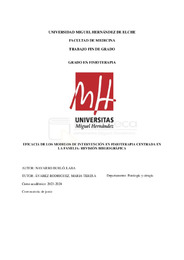Por favor, use este identificador para citar o enlazar este ítem:
https://hdl.handle.net/11000/33661Registro completo de metadatos
| Campo DC | Valor | Lengua/Idioma |
|---|---|---|
| dc.contributor.advisor | Álvarez Rodríguez, María Teresa | - |
| dc.contributor.author | Navarro Burló, Lara | - |
| dc.contributor.other | Departamentos de la UMH::Patología y Cirugía | es_ES |
| dc.date.accessioned | 2024-10-25T11:10:02Z | - |
| dc.date.available | 2024-10-25T11:10:02Z | - |
| dc.date.created | 2024-06-04 | - |
| dc.identifier.uri | https://hdl.handle.net/11000/33661 | - |
| dc.description.abstract | INTRODUCCIÓN: La atención temprana tiene como objetivo proporcionar una respuesta precoz a las necesidades transitorias o permanentes presentadas por niños con alteraciones en su desarrollo o con riesgo de padecerlos. Los modelos centrados en la familia proporcionan un enfoque conveniente para este abordaje, identificando si en los últimos 6 años ha habido estudios recientes que hablen de la evidencia y la eficacia de esta. OBJETIVOS: Explorar la evidencia científica sobre la eficacia de los modelos de intervención de fisioterapia centrada en la familia, analizando las intervenciones más utilizadas y observando si existe una mejora en la calidad de vida en los niños y sus familias. MATERIAL Y MÉTODOS: Se realizó una búsqueda bibliográfica de artículos publicados en Medline/PubMed, PeDro, Scopus y Cochrane desde el año 2019 hasta la actualidad. RESULTADOS: Después de aplicar los criterios de inclusión en la búsqueda se encontraron 10 estudios, estos fueron los que analizaron las distintas metodologías de tratamiento centradas en la familia. CONCLUSIONES: La terapia centrada en la familia es una de las terapias que mejor aceptación obtiene por parte de los padres, además, se ha visto que es la que mejores resultados obtiene en prematuros. Sin embargo, se requieren más estudios para evidenciar si esta intervención puede ayudar a niños con alteraciones asociadas al neurodesarrollo y si la combinación con otras terapias puede ser más eficiente. | es_ES |
| dc.description.abstract | INTRODUCTION: The objective of early care is to provide an early response to the temporary or permanent needs presented by children with alterations in their development or at risk of suffering from them. Family-centered models provide a convenient approach to this approach, identifying whether there have been recent studies in the last 6 years that speak to the evidence and effectiveness of this. OBJECTIVE: Explore scientific evidence on the effectiveness of family-centered physiotherapy intervention models, analyzing the most used interventions and observing whether there is an improvement in the quality of life in children and their families. MATERIAL AND METHODS: A bibliographic search was carried out for articles published in Medline/PubMed, PeDro, Scopus and Cochrane from 2019 to the present. RESULTS: After applying the inclusion criteria in the search, 10 studies were found; these were the ones that analyzed the different treatment methodologies focused on the family. CONCLUSION: Family-centered therapy is one of the therapies that obtains the best acceptance from parents, in addition, it has been seen that it is the one that obtains the best results in premature babies. However, more studies are required to show if this intervention can help children with alterations associated with neurodevelopment and whether the combination with other therapies can be more efficient. | es_ES |
| dc.format | application/pdf | es_ES |
| dc.format.extent | 35 | es_ES |
| dc.language.iso | spa | es_ES |
| dc.publisher | Universidad Miguel Hernández | es_ES |
| dc.rights | info:eu-repo/semantics/openAccess | es_ES |
| dc.rights | Attribution-NonCommercial-NoDerivatives 4.0 Internacional | * |
| dc.rights.uri | http://creativecommons.org/licenses/by-nc-nd/4.0/ | * |
| dc.subject | Fisioterapia centrada en la familia | es_ES |
| dc.subject | atención temprana | es_ES |
| dc.subject | fisioterapia | es_ES |
| dc.subject | COPCA | es_ES |
| dc.subject | Alteraciones del neurodesarrollo | es_ES |
| dc.subject.other | CDU::6 - Ciencias aplicadas | es_ES |
| dc.title | Eficacia de los modelos de intervención en fisioterapia centrada en la familia: revisión bibliográfica | es_ES |
| dc.type | info:eu-repo/semantics/bachelorThesis | es_ES |

Ver/Abrir:
TFG NAVARRO BURLÓ, LARA.pdf
1,04 MB
Adobe PDF
Compartir:
 La licencia se describe como: Atribución-NonComercial-NoDerivada 4.0 Internacional.
La licencia se describe como: Atribución-NonComercial-NoDerivada 4.0 Internacional.
.png)